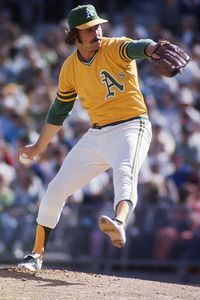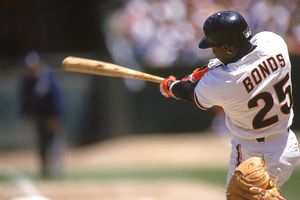Baseball's first free agent was Catfish Hunter, declared a free agent after the 1974 season when Oakland A's owner Charles Finley failed to pay an insurance premium as required in Hunter's contract.
Hunter had won the AL's Cy Young Award in '74 after winning 25 games. He was 28 years old. You can imagine the demand for his services. According to accounts, the only team besides Oakland not to pursue Hunter was the Giants. A young owner of the Yankees named George Steinbrenner won the bidding war, signing Hunter to a five-year deal worth $3.35 million. That's an average salary of $670,000 per season. Considering baseball's highest-paid player in 1974 was Dick Allen of the White Sox at $250,000, you can see why baseball players were suddenly drooling over the huge pot of cash available to them if only they could eliminate the reserve clause (they would; the free-agency era began after the 1976 season).
Focus on Sport/Getty Images
Catfish Hunter left the A's to become baseball's first star free agent.
The background: Another former Oakland star, the A's had traded Reggie to Baltimore in 1976, knowing they would lose him anyway. The 1973 AL MVP, Reggie was already a controversial personality and would be turning 31 years old in '77. But he had finished second in the AL in home runs and first in slugging percentage in '76. The contract: Five years, $3.5 million. The reward: Yankees, meet Mr. October. Reggie famously blasted his three home runs in Game 6 of the 1977 World Series and then hit .462 in the 1978 ALCS and .391 in the World Series as they won it again. He signed with California after a poor 1981 season, but he left as a Yankee legend.
Goose Gossage, Yankees, 1978
The background: After coming up with the White Sox, Gossage was traded to Pittsburgh in 1977, where he had one of the greatest relief seasons ever: 11-9, 133 innings, 78 hits, 151 strikeouts, 1.62 ERA. He was acknowledged as perhaps the hardest thrower in the game (along with Nolan Ryan), and even though Sparky Lyle had won the AL Cy Young Award in '77 while serving as the Yankees' closer, the Bronx Bombers opened their wallets.
Pete Rose, Phillies, 1979
The background: Charlie Hustle was still going strong, even though he'd be turning 38 for the 1979 season: He was coming off a season in which he hit .302 with 51 doubles and had an NL-record 44-game hitting streak. He was arguably the most famous and most popular player in the sport, even though he wasn't a big home-run hitter and had the worst haircut in MLB history. The Phillies surprisingly signed Rose, and this 1979 story in Sports Illustrated shows how the Phillies' deal with their local TV affiliate helped justify their "big" expenditure.
The background: One of the AL's top hurlers during the '80s, Morris had a couple of tough seasons with Detroit, going 6-14, 4.86 in 1989 and 15-18, 4.51 in 1990. The Twins had gone 74-88 in 1990, but had a couple of second-year starters to build around in Scott Erickson and Kevin Tapani. They needed a veteran leader for the pitching staff. Morris signed with his hometown team. The contract: One year, $3.7 million. The reward: While the contract was for just one year, the Twins did make Morris the second-highest-paid player in the AL that season. He rewarded them with 18 wins, 247 innings, a 3.43 ERA and, of course, the greatest World Series Game 7 pitching performance in history.

Otto Greule Jr/Getty Images
Barry Bonds in 1993 -- the year he led the NL with 46 home runs, a .458 on-base percentage and .677 slugging percentage.
Barry Bonds, Giants, 1993
The background: Bonds was the NL MVP with the Pirates in 1990 and 1992 and finished second in 1991, as the Pirates won the East all three seasons. Alas, Bonds hit just .191 with three RBIs in 20 postseason games and failed to throw out Sid Bream at home plate as Pittsburgh lost all three NLCS. Many believe the Pirates didn't re-sign Bonds because they had chosen instead to sign the less-talented (but white) Andy Van Slyke to a big deal (he had signed a three-year, $12.6 million contract before the 1991 season). Bonds, in a 1992 article in the New York Times, referred to Van Slyke as the "Great White Hope" and "Mr. Pittsburgh." He also indicated Van Slyke had received preferential treatment over Bobby Bonilla from Pirates management (Bonilla had signed with the Mets as a free agent after 1991). It's probably more accurate to suggest Bonds was unlikely to sign with Pittsburgh regardless of the Pirates' interest -- especially once the bidding hit record highs.
Greg Maddux, Braves, 1993
The background: Maddux had won 20 games and the Cy Young Award for the first time with the Cubs in 1992, going 20-11 with a 2.18 ERA. He was 26 years old, durable (he had never missed a start) and much-desired. The Cubs reportedly offered five years and $27.5 million and the Yankees even more, but he signed with Atlanta.
Randy Johnson, Diamondbacks, 1999
The background: Seattle had traded Johnson to Houston at the trading deadline in 1998, and the Big Unit absolutely destroyed National League hitters, going 10-1 with a 1.28 ERA in 11 starts. While Johnson had made 34 starts in '98, there were lingering concerns about a bad back that had forced him to miss most of the 1996 season.
The background: Ramirez had driven in a remarkable 432 runs over his previous three seasons with Cleveland (despite missing 44 games in 2000) and had hit a career-high .351 in 2000. Despite his physical and mental lapses in the field and on the bases, he and Alex Rodriguez were the two prize commodities in the 2000-01 free-agent market. The contract: Eight years, $160 million. The reward: Former Red Sox GM Dan Duquette stunned the baseball world with this deal (although it was nearly $100 million less than what the Rangers signed A-Rod for). In fact, the Red Sox themselves realized it was nearly impossible for a player to literally earn this kind of salary; after Duquette was fired, the new regime actually put Ramirez on waivers following the 2003 ALCS loss to the Yankees. Good fortune struck for Boston when no team picked him up, so they kept him. In 2004, Ramirez hit .308 with 43 home runs and 130 RBIs and finished third in the MVP voting … oh, and was named World Series MVP as the Red Sox ended some kind of curse. It's safe to say, with the Red Sox winning again in 2007 (with Ramirez driving in 16 runs in 14 postseason games), Boston would not have the two championships without Ramirez. Yes, every franchise can't afford $160 million; for the Red Sox, Duquette's folly proved fabulous.
Ichiro Suzuki, Mariners, 2001
The background: The biggest superstar in Japan, Suzuki had hit .385, .342, .356, .345, .358, .343 and .387 in his seven full seasons there, and had topped 20 home runs twice. Still, no Japanese position player had ever played in the U.S., and there were concerns the slightly built outfielder wouldn't be able to handle major league fastballs.
David Ortiz, Red Sox, 2003
The background: He wasn't a true free agent in the standard sense; the Twins had non-tendered Ortiz, then turning 27, after a .272/.339/.500 season in 125 games. But every team had a chance to sign the lefty slugger, who had battled inconsistency and minor injuries in Minnesota. Boston signed him to provide help at first base and DH.
Original here
No comments:
Post a Comment